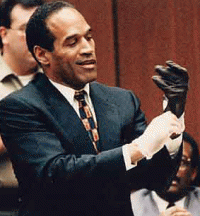I too find the rush to judge people irritating, but I think there are two "varieties" of the court of public opinion that are erroneously scolded together, when they are two very different things.
The Rush To Judge
This is usually where people (including myself) have problems. Often times people and the media have a preconceived notion of the person involved, either by that person's past, or by a loose affiliation that person has. Sometimes it depends on the crime a person is being accused of. Randy Moss and Terrell Owens don't get any slack from anyone, other athletes could get away with murder. As a whole, however, people have a pretty negative view of athletes and celebrities in general. The masses are pretty quick to accept any negative rumor and the media is more than happy to regurgitate the rumor. Generally, they sprinkle in some wild speculations of their own just for good measure. No one involved does any real research of their own. We're all guilty of this from time to time.Certain allegations, like steroids, can tarnish the career of an athlete forever. For one thing, how can you ever prove you didn't do it? "Your honor, I would like to submit as Exhibit A a video tape of my client not using steroids."
Likewise, certain crimes, like rape and pedophilia, are a lifelong scarlet letter from the moment you're accused. You could have been on live national television, across the country from where the crime was committed, during the time you were accused of committing the crime, and it would still be tied to you forever.
Part of this phenomenon is because people simply don't follow up on negative things they read about someone else. Even if a person would follow up on a story, the less juicy retraction/explanation/correction is buried, compared to where the original story was. On top of all that, even if a person had the desire to follow up, and was able to, studies have shown humans will maintain a relationship between two concepts, but will eventually drop the negative. So, for example, Barack Obama publicly denying the rumor he's Muslim is actually, on some level, helping cement the rumor.
The public is very quick to vilify a person accused of a heinous crime. Often time people celebrate convictions, or riot over non-convictions, as if the conviction itself determined if that person was actually responsible for the crime. I understand the anger that would follow if the person on trial is almost assuredly the person that shot your loved one, if they were would to be found not guilty on some lame technicality. It seems, however, there are many cases where the rush to just convict someone takes precedence over finding the right person.
Sadly, Jon Q Public and Sally Ann Newsreporter are not the only ones caught up in this just-convict-someone attitude. You don't need to look any further to see that "innocent until proven guilty" doesn't even officially apply in our court system than to look at the prosecution when the verdict is read. If they “win” they celebrate like they just won the Super Bowl and if they “lose” they react like they just lost a family member. No matter what the verdict, justice was served, the system exists just as much to let the innocent go as it does to convict the guilty. Somehow, despite this fact, prosecution turned into a “win at all stakes” game. In some extreme cases, evidence has been suppressed by the Prosecution that would exonerate the accused.
I'm not trying to argue a significant number of people convicted of crimes are really innocent, I don't think that is true at all, but that doesn't mean we don't have a problem.
Reasoned Consensus
Now, here's where I think the “court of public opinion” “bashing” needs to stop. The court system is a scientific approach by necessity. Unless it can prove, beyond reasonable doubt, a person is guilty they have to assume your innocence. Reasonable people, however, can come to a consensus based on what is most likely.An analogy and a concrete example:
The Loch Ness Monster
Science hasn't proven the Loch Ness Monster doesn't exist. Science CAN'T prove Nessy isn't out there. It just doesn't work that way. Who's to say the “monster” doesn't vaporize back to it's home planet any time it senses it's being looked for? Now, that doesn't mean science is useless in the fight against cryptozoologists. Sonar has been used to ping out the layout of the, actually quite small, body of water and turned up nothing. Biologists can point out the fact that there isn't enough biomass in the water to support anything that size. The sheer amount of people touring the area or actively searching for Nessy should have turned up something more than a 60 year old Polaroid. (Which, by the way, was later admitted to be fake by the people who took it.) None of this information PROVES anything, but anyone with a handful of firing synapses can look at it and, correctly, determine the likelihood of a giant monster going unproven in a mud puddle is confirmation enough it doesn't exist.
O.J. Simpson
I've said this before, and I get some crazy looks for it, but I'll state it here forever ingrained in ones and zeros:
The jury made the right decision in the O.J. Simpson trial.
I'll follow it up with this statement: There is no doubt in my mind, O.J. Simpson is a murderer.
The Prosecution had the burden of proof in the O.J. trial, just like in any other. The defense was allowed the opportunity to plant seeds of doubt in the minds of the jury during the process. Example: "If it doesn't fit, you must acquit." Now, obviously to any reasonable person a blood soaked glove, that had been frozen and thawed many times over, that were being tried on over rubber gloves, were meant to be tight to begin with, which were being put on by the person who's life depends on not putting them on, doesn't mean anything. But to a person charged with looking at it a little more critically, it's a seed of doubt.
In an era when explaining DNA evidence to a jury was tantamount to explaining the intricacies of string theory to middle school students, the defense planted enough of these seeds, in my opinion, that people charged with deciding if they had a reasonable doubt or not made the right choice.
None of this, however, has anything to do with how the public should have perceived O.J. Simpson, even at the time, let alone in hindsight. We are fully within our rights to see him however we want. (And I don't mean this in the sense that you are free to believe a race of Ice Cream cones controls the universe from their posts on the Sun, if you wanted.) We don't have to be scolded that “he was found innocent.” Both sides have different levels of proof required to fulfill the requirements. As such, they can come to completely different verdicts and still both be correct, given the parameters.
Generally speaking, in the court of public opinion the burden of proof is on no one in particular, and we really only need to be convinced what is more likely than the alternative. We should still wait until we can even tell what is more likely than not to form our opinion. However, I see no problem, in principal, with the public differing in their opinion from the legal system.
So, before you scold the "Court of Public Opinion" again, stop to consider that the public isn't bound by the same burden of proof that the normal court system has to abide by, nor should we be.
-Jeremy Lindgren reminds you that if indeed he really did write this article, it would have even more grammatical mistakes in it.












 Fetching Nutcan Content....
Fetching Nutcan Content....





